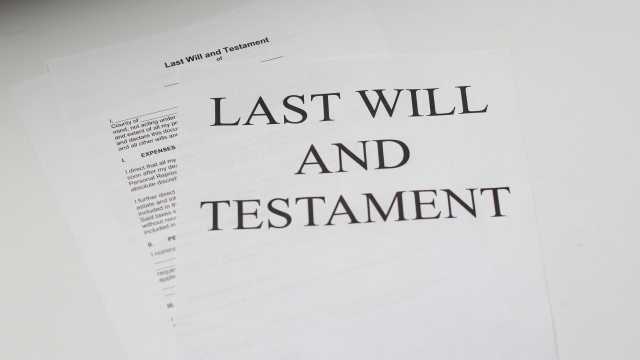Estate Planning
When someone passes away, their assets—whether cash, property, or investments—must be distributed to beneficiaries. If you've recently inherited money, you may be wondering whether you owe taxes on it. The good news is that, in most cases, inherited money itself is not taxable. However, there are exceptions, particularly when it comes to estate taxes and investment income.

R. Tyler End, CFP®
•
Published August 9th, 2024
•
Updated October 12th, 2024
Table of Contents
Key Takeaways
Cash inheritances and property transfers are generally tax-free. However, income generated from inherited assets, such as interest, dividends, or capital gains, may be subject to taxation.
The federal estate tax exemption is $13.61 million in 2024, meaning only estates exceeding this amount are subject to estate taxes. Some states also impose inheritance taxes, so state laws should be checked.
If you inherit a traditional IRA or 401(k), required distributions are taxed as ordinary income. Similarly, if you sell inherited property for a profit, you may owe capital gains tax on the amount above the stepped-up value.
When someone passes away, their assets—whether cash, property, or investments—must be distributed to beneficiaries. If you've recently inherited money, you may be wondering whether you owe taxes on it. The good news is that, in most cases, inherited money itself is not taxable. However, there are exceptions, particularly when it comes to estate taxes and investment income.
Understanding IRS regulations can be complex, especially since estate tax laws have changed over the years. This guide will break down the key rules and help you determine if your inheritance is subject to taxation.
Are Estate Distributions Taxable?
For most individuals, an inheritance does not need to be reported as taxable income. However, certain scenarios can trigger tax obligations.
Estate Tax vs. Inheritance Tax:
- The federal estate tax applies to estates that exceed a certain threshold. As of 2024, estates valued under $13.61 million are exempt. If an estate surpasses this limit, the estate—not the beneficiaries—pays the tax before assets are distributed.
- State inheritance taxes may apply in certain states, regardless of federal exemptions. These states include Iowa, Kentucky, Maryland, Nebraska, New Jersey, and Pennsylvania. The rate and exemption levels vary by state.
Investment Income on Inherited Assets:
- While the original inheritance amount is typically tax-free, any income generated from inherited investments (such as interest, dividends, or rental income) is taxable.
- If you inherit a retirement account (e.g., IRA, 401(k)), required distributions may be subject to ordinary income tax.
Do You Have to Report an Inheritance on Your Taxes?
If you inherit cash or property, you generally do not have to report it as taxable income. However, there are exceptions:
- Capital Gains on Property Sales: If you sell an inherited home, stocks, or other assets, you may owe capital gains tax on the profit (i.e., the amount above the stepped-up basis).
- Inherited Retirement Accounts: Traditional IRAs and 401(k)s require beneficiaries to take required minimum distributions (RMDs), which are taxed as regular income.
- Income Generated from an Inheritance: Interest from inherited bank accounts, dividends from stocks, or rental income from inherited property is taxable.
How the IRS Tracks Inheritances
You may be wondering: How does the IRS know if you inherit money? The IRS typically doesn’t track standard inheritances unless they involve taxable income or estate filings. However:
- Estates that exceed the federal threshold must file Form 706 (Estate Tax Return), which is a public record.
- Banks, financial institutions, and brokerage firms report taxable distributions to the IRS using 1099 forms if the inherited assets generate income.
When Are Distributions from an Estate Taxable?
To clarify, here’s a breakdown of when inherited money or assets may be taxable:
| Type of Inheritance | Taxable? | Notes |
|---|---|---|
| Cash inheritance | No | Generally not taxable at the federal level. |
| Inherited property | No, unless sold | Capital gains tax applies only if you sell for more than the stepped-up value. |
| Retirement accounts (IRA, 401k) | Yes | Distributions from traditional IRAs and 401(k)s are taxable. |
| Life insurance proceeds | No | Tax-free unless interest is earned on delayed payments. |
| Investment accounts | Yes, if earning dividends | Any future earnings on stocks, bonds, or mutual funds are taxable. |
Estate Tax Exemptions by Year
If you inherit from a high-value estate, estate tax may apply. The IRS estate tax exemption has changed over time:
| Year | Federal Estate Tax Exemption |
|---|---|
| 2018 | $11,180,000 |
| 2019 | $11,400,000 |
| 2020 | $11,580,000 |
| 2021 | $11,700,000 |
| 2022 | $12,060,000 |
| 2023 | $12,920,000 |
| 2024 | $13,610,000 |
Only estates exceeding these amounts are subject to federal estate tax.
Final Thoughts
If you're unsure how your inheritance affects your taxes, consulting with a Certified Financial Planner (CFP) or tax professional can help you navigate IRS rules, minimize tax liabilities, and maximize the value of your inheritance.
Final Thoughts
If you've inherited money or assets, it’s crucial to understand whether taxes apply. While most inheritances are not considered taxable income, certain assets—such as investment earnings, retirement accounts, and property sales—may trigger tax obligations.
If you're unsure how your inheritance affects your taxes, consulting with a Certified Financial Planner or tax professional can help you navigate IRS rules, minimize tax liabilities, and maximize the value of your inheritance.
Frequently Asked Questions
Are Executor Fees Taxable?
When managing an estate, an executor may choose to take a fee for their services. Executor fees are considered taxable income and must be reported on the executor’s tax return. However, some executors—especially those handling a family member’s estate—choose to waive this fee to avoid taxation.
Do Some States Tax Inheritances?
While the federal government no longer imposes an inheritance tax, some states still do. As of 2024, the following five states levy an inheritance tax:
- Iowa
- Kentucky
- Nebraska
- New Jersey
- Pennsylvania
- However, most states exempt spouses and direct descendants (children and grandchildren) from paying inheritance tax. The tax rates vary by state, with some charging up to 16% on inheritances above a certain threshold.
Additionally, 12 states and the District of Columbia impose estate taxes, with Connecticut having the highest exemption amount ($13.61 million) and Oregon having the lowest exemption at $1 million.
How Can Beneficiaries Minimize or Avoid Estate Taxes?
Although estate taxes only apply to high-value estates, individuals with significant wealth often take steps to reduce their estate tax burden. Some common strategies include:
- Gifting assets in advance – The IRS allows individuals to gift up to $18,000 per year per recipient (as of 2024) without triggering gift taxes.
- Setting up an irrevocable life insurance trust (ILIT) – This keeps life insurance payouts outside of the taxable estate.
- Charitable donations – Leaving assets to a qualified charitable organization can reduce the taxable value of an estate.
These strategies are particularly useful for high-net-worth individuals who may be subject to estate taxes.
Estate Tax vs. Inheritance Tax: What’s the Difference?
Many people confuse estate tax with inheritance tax, but they apply to different aspects of an estate transfer:
- Estate Tax – Paid by the deceased’s estate before assets are distributed to beneficiaries.
- Inheritance Tax – Paid by the beneficiary after receiving an inheritance, depending on state laws.
For example, if someone passes away in Maryland, their estate may be subject to both estate and inheritance taxes, making it one of the few states where both apply.
Share this advice

Tyler is a Certified Financial Planner® and CEO & Co-Founder at Retirable, the retirement peace of mind platform. Tyler has nearly 15 years of experience at leading companies in the wealth management and insurance industries. Before Retirable, Tyler worked as Head of Operations Expansion at PolicyGenius, expanding the company’s reach into new products — turning PolicyGenius into an industry-leading disability and P&C insurance distributor. Before working at PolicyGenius, Tyler worked as Wealth Management Advisor at prominent financial services organizations.
As an advisor, Tyler played an integral role in helping clients define goals, achieve financial independence and retire with peace of mind. Through this work, Tyler has helped hundreds of thousands of people get the financial planning and insurance advice they need to succeed. Since founding Retirable, Tyler’s innovative approach to retirement planning has been featured in publications such as Forbes, Fortune, U.S. News & World Report, and more.
Intro to Estate Planning
Wills
Trusts
Divorce Considerations For Retirement
Estate Settlement
Share this advice

Tyler is a Certified Financial Planner® and CEO & Co-Founder at Retirable, the retirement peace of mind platform. Tyler has nearly 15 years of experience at leading companies in the wealth management and insurance industries. Before Retirable, Tyler worked as Head of Operations Expansion at PolicyGenius, expanding the company’s reach into new products — turning PolicyGenius into an industry-leading disability and P&C insurance distributor. Before working at PolicyGenius, Tyler worked as Wealth Management Advisor at prominent financial services organizations.
As an advisor, Tyler played an integral role in helping clients define goals, achieve financial independence and retire with peace of mind. Through this work, Tyler has helped hundreds of thousands of people get the financial planning and insurance advice they need to succeed. Since founding Retirable, Tyler’s innovative approach to retirement planning has been featured in publications such as Forbes, Fortune, U.S. News & World Report, and more.




